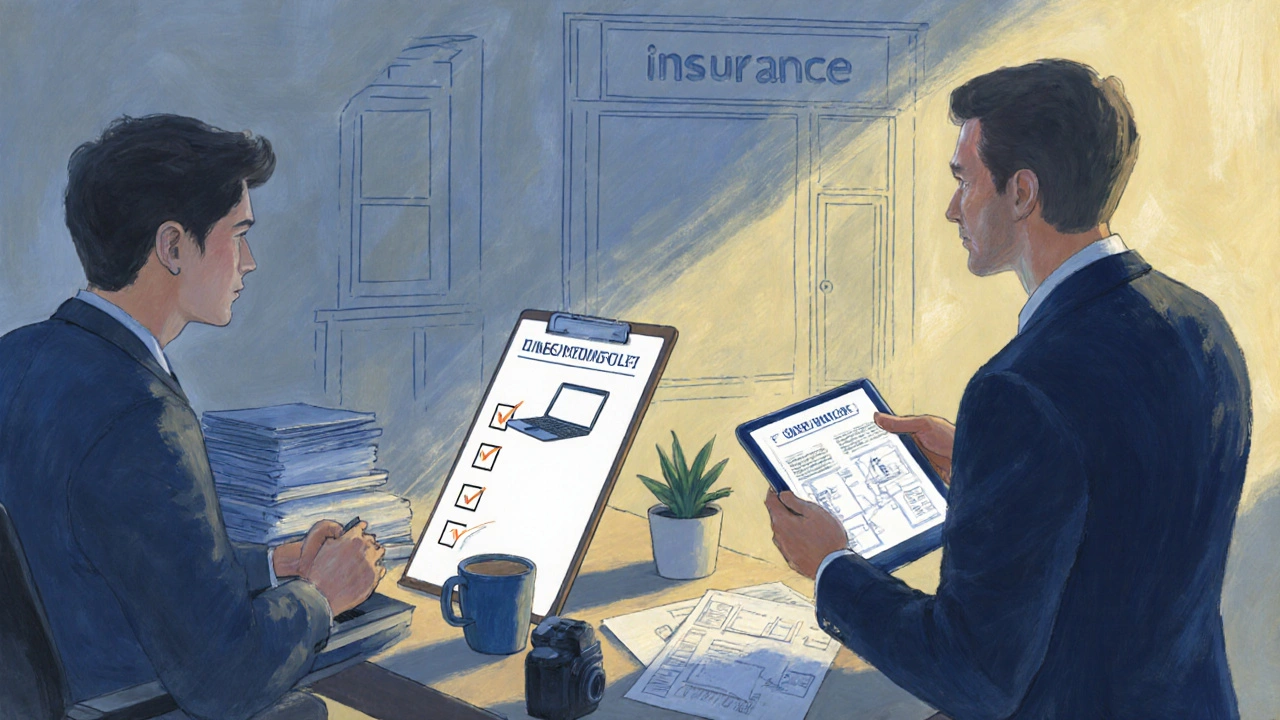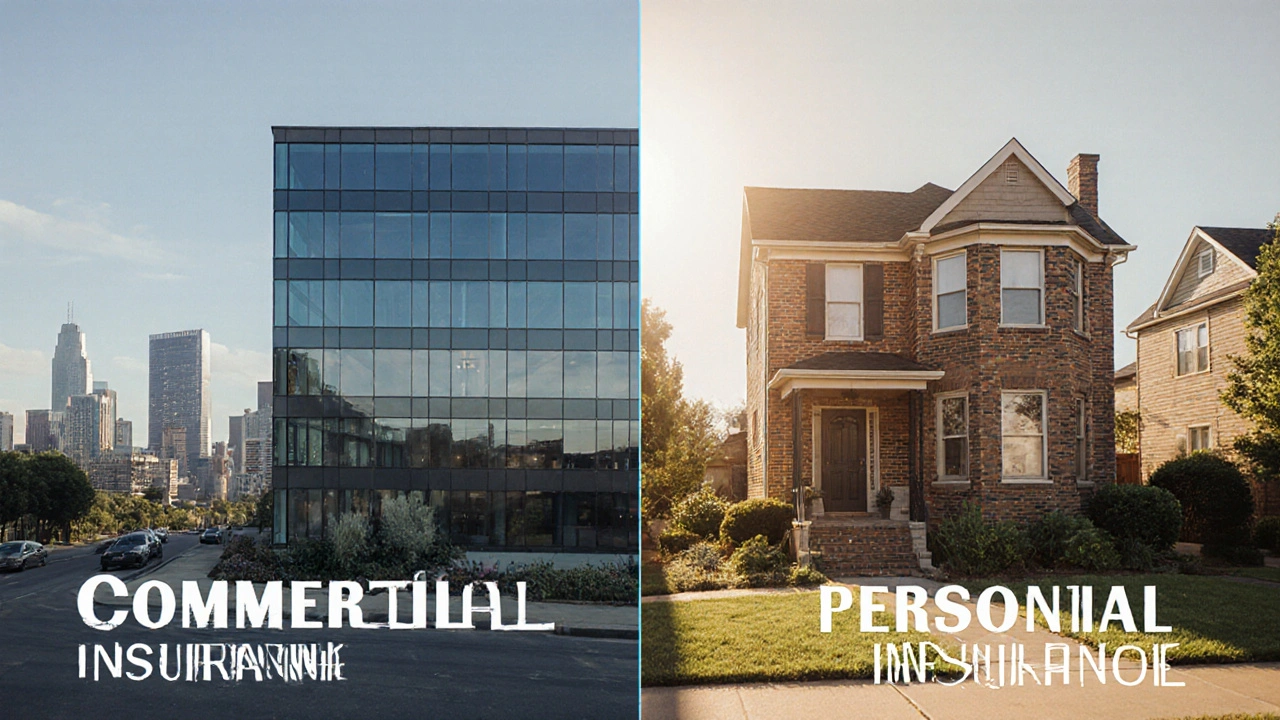Commercial vs Personal Insurance Cost Calculator
Compare Commercial and Personal Insurance Costs
This calculator estimates annual premiums for commercial and personal insurance based on coverage type, limits, deductible, and risk factors. It helps you determine which option is more cost-effective for your specific situation.
Results
Why Commercial Insurance May Be Better For You
Why Personal Insurance May Be Better For You
Key Takeaways
- Commercial policies often cost more upfront but can save money through higher limits and tailored risk management.
- Personal policies are cheaper for low‑risk activities, but they may leave gaps if you run a side‑business.
- Premiums are driven by factors such as coverage limits, deductible choices, claim history, and industry risk.
- Bundling, higher deductibles, and proactive risk assessments can tip the cost balance either way.
- Use the decision checklist at the end to match your situation with the most cost‑effective option.
What Exactly Is Commercial Insurance?
When you first hear the term commercial insurance is a collection of policies designed to protect businesses from financial loss due to property damage, liability claims, employee injuries, and more.
Because it covers a broader range of risks, a commercial policy usually includes higher coverage limits, optional extensions (like cyber liability), and tailored underwriting based on the specific industry.
What Exactly Is Personal Insurance?
Personal insurance is a set of policies aimed at protecting an individual’s private life, such as home, auto, health, and personal liability.
These policies assume the insured is acting in a personal capacity, not as a business operator. The coverage limits are lower and the risk profile is generally simpler.
How Are Premiums Calculated?
Both commercial and personal premiums boil down to the same core variables, but the weight of each variable changes. Below are the main drivers:
- Premium is the amount you pay for the policy, usually expressed as an annual or monthly figure.
- Coverage limit determines the maximum payout. Higher limits increase the premium.
- Deductible is the out‑of‑pocket amount you agree to pay before the insurer steps in. Raising the deductible typically lowers the premium.
- Risk assessment evaluates how likely a claim is based on industry, location, safety measures, and claim history.
- Claim frequency reflects how often the policyholder has filed claims in the past. More claims often mean higher premiums.
- Underwriting is the insurer’s process of deciding price and terms after reviewing the risk profile.
- Insurance broker can negotiate better rates or bundle policies for a discount.
Typical Cost Ranges in 2025 (UK Focus)
| Policy Type | Coverage Limit (Typical) | Average Annual Premium | Key Influencers |
|---|---|---|---|
| Commercial Property | £250,000 - £1M | £3,200 - £9,800 | Location, construction type, security measures |
| Public Liability (Business) | £1M - £5M | £850 - £2,400 | Industry risk, claim history, turnover |
| Homeowners (Personal) | £200,000 - £500,000 | £300 - £750 | Property age, security, location |
| Personal Auto | £10,000 - £30,000 | £450 - £1,200 | Driving record, vehicle type, mileage |
These numbers are averages from the UK market in 2025. A tech start‑up with high‑value equipment may see the commercial property premium push toward the upper band, while a freelance graphic designer working from home may pay the lower end of personal homeowners insurance.
Hidden Costs and Ways to Save
Beyond the headline premium, look out for these extra expenses:
- Policy administration fees - some brokers add a flat fee each renewal.
- Excessive deductibles - a higher deductible lowers the premium but can strain cash flow during a claim.
- Coverage gaps - buying a personal policy for a home‑based business can leave you exposed to business‑related claims.
- Regulatory compliance - certain industries (e.g., construction) must meet legal minimums that raise premium.
Saving tips:
- Bundle business and personal policies with the same insurer to snag a 5‑10% discount.
- Invest in risk‑mitigation measures (fire alarms, security cameras) - insurers often award a premium reduction of 3‑12%.
- Shop around annually; the market is competitive and a modest change can shave a few hundred pounds.
- Consider a higher deductible if your cash reserves can cover a short‑term loss.

When Commercial Insurance Beats Personal Insurance
If you run a storefront, a manufacturing line, or a consultancy that serves multiple clients, the commercial insurance cost can actually be lower per unit of coverage than trying to patch a personal policy with add‑ons. Here’s why:
- Higher coverage limits are built‑in, so you avoid buying separate personal policies plus business endorsements.
- Specialized underwriting can recognize risk‑reduction steps you’ve already taken, shaving the premium.
- Business liability is covered, which personal policies usually exclude, meaning you avoid a costly gap.
Case example: A boutique bakery in Manchester bought a commercial combined property‑and‑public‑liability package for £1,800 annually. If the owner tried to use a personal home insurance plus a separate public liability endorsement, the total would have been around £2,300 - a 27% increase.
When Personal Insurance Is the Cheaper Choice
For freelancers, remote workers, or hobby‑ist entrepreneurs who operate out of a personal residence with minimal equipment, personal policies often win on price. The main reasons:
- The risk exposure is low; insurers price the premium accordingly.
- Coverage limits are modest, matching the actual value of assets.
- There’s no need for business‑specific endorsements, which add cost.
Case example: A freelance web designer works from a home office, uses a laptop worth £1,200, and has no client‑facing public space. A personal contents policy with a £500,000 personal liability rider costs £420 per year, whereas a minimal business policy would start at £650 - a 55% increase for little extra protection.
Decision Checklist - Pick the Right Policy for Your Wallet
- Identify your primary activities: Are you selling products/services to the public? If yes, think commercial.
- List assets you need to protect: equipment, inventory, professional indemnity, client data.
- Calculate the total value of those assets - this helps determine needed coverage limits.
- Review your claim history: Frequent claims push premiums up for both types.
- Compare quotes side‑by‑side: Use the table above as a benchmark.
- Check for gaps: If a personal policy leaves out business liability, add a separate rider or switch to commercial.
- Factor in hidden costs (fees, deductibles, compliance). Add them to the quoted premium before deciding.
- Ask your broker about bundling discounts or risk‑mitigation credits.
Following this list usually points you toward the cheaper, more suitable option - whether that’s a lean personal plan or a full‑blown commercial package.
Frequently Asked Questions
Can I use a personal policy for my home‑based business?
You can, but only if the business activity is low‑risk and the insurer explicitly allows a home‑based use clause. Most personal policies exclude public liability, so a claim from a client could be denied.
Do commercial policies always cost more than personal ones?
Not necessarily. If the commercial coverage is tightly scoped and the risk profile is low, the premium can be comparable to a personal policy with similar limits. The key is matching coverage to actual risk.
What deductible should I choose to lower my premium?
A higher deductible reduces the premium, but only if you have enough cash reserves to cover the out‑of‑pocket amount after a loss. A common sweet spot is a £1,000‑£2,500 deductible for small businesses.
Are there tax benefits to choosing commercial insurance?
In the UK, most commercial insurance premiums are allowable business expenses, which can reduce taxable profit. Personal insurance premiums are generally not deductible unless the policy explicitly covers business use.
How often should I review my insurance needs?
At least once a year, or whenever a major change occurs - new equipment, staff hires, expansion into new markets, or a significant claim.


